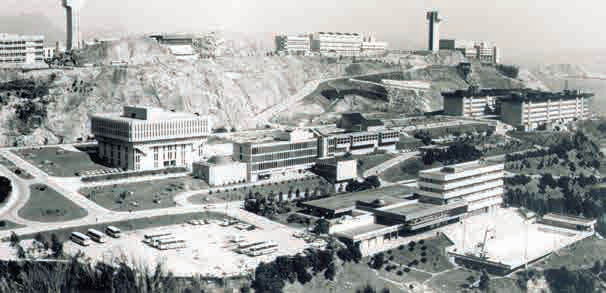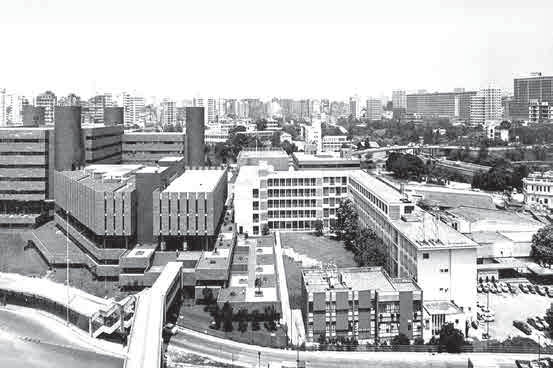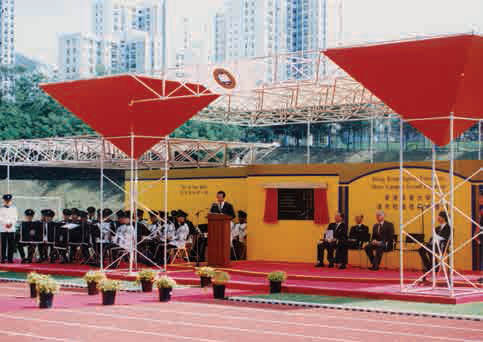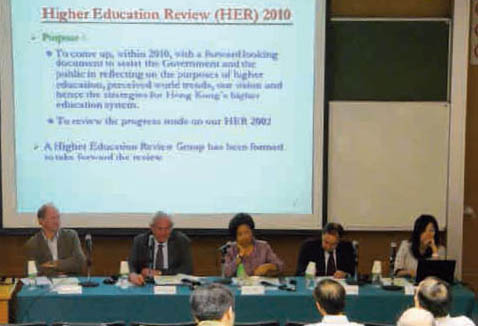Early Years
HKU and CUHK gradually expanded with increased government grants.
Late 1960sRecognising the possible need for a polytechnic-type institution, a Polytechnic Planning Committee was established under the UGC in May 1969.
1969The Polytechnic Planning Committee submitted its final report.

HKU campus in the 1970s

CUHK campus in the 1970s

The Hong Kong Polytechnic in the 1970s
1971
The Hong Kong Polytechnic was formally established, taking over the campus and staff of the Hong Kong Technical College in Hung Hom, established in 1947. The new polytechnic came under the aegis of the UGC, which was renamed the University and Polytechnic Grants Committee (UPGC) in April.
1972Pursuant to the proposals to expand the university student population contained in the 1978 White Paper on the Development of Senior Secondary and Tertiary Education published by the Government, the UPGC recommended to the Government a four per cent annual increase of the university student population. The Government accepted the recommendation.
1981Hong Kong Baptist College, set up in 1956, came under the aegis of the UPGC.
The UPGC accepted the report of the working group on research, chaired by Lord Flowers, that envisaged a phased increase in funds in the block grants for fundamental research and the establishment of a Research Grants Committee, which would, through a system of peer evaluation, consider applications for the funding of particular research projects in areas of strategic importance to the city. The UPGC recommended to the Government the need for funding for research in institutions to maintain the academic health of the institutions, as well as to provide a base on which the community, business and industry could draw for particular research projects.
1983City Polytechnic of Hong Kong was established and brought within the ambit of the UPGC.
1984The Government announced a massive expansion of opportunity for undergraduate education by increasing the number of first-year, first-degree places to 15 000 (subsequently reduced to 14 500 in light of revised population projection following the 1991 census) by 1994/95 academic year - a participation rate of 18 per cent for the 17 to 20 age group.
The UPGC was commissioned by the Government not only to advise on, and oversee the implementation of, the expansion plan itself, but also to undertake a review of the development of higher education in Hong Kong with a view to determining whether further expansion of tertiary education would be desirable or practicable over the period 1995-2000.
1989Based on the UPGC's recommendation, the Research Grants Council (RGC) was established in January under the aegis of the UPGC, to advise the Government on research funding among tertiary institutions, with members comprising local and overseas academics, and local lay members. The council provides funding support for diverse research projects and activities through its Earmarked Research Grant.
Lingnan College was made a degree-conferring institution and came under the aegis of the UPGC.
The Hong Kong University of Science and Technology was established and brought under the ambit of the UPGC.
In response to the recommendations in the Education Commission's Reports Numbers 3 and 4 in 1988 and 1990 respectively that additional resources should be provided for remedial teaching of English at tertiary institutions, the UPGC provided institutions with Language Enhancement Grants as additional support for students' language enhancement.

The opening of HKUST in 1991
1991
The first Research Assessment Exercise (RAE) was launched by the UPGC as part of its performance-based assessment process, followed by subsequent exercises in 1996, 1999, 2006 and 2014. Research submissions from the UGC-funded institutions were reviewed by panels comprising local and international experts. The RAE results have been used to inform the distribution of the research portion of the UGC block grant to institutions since then.
The UPGC supported an eight per cent increase in taught postgraduate numbers per annum and about five per cent in research graduates per annum in the 1995-98 triennium.
1993City Polytechnic of Hong Kong, Hong Kong Baptist College and Hong Kong Polytechnic were granted university status and renamed City University of Hong Kong, Hong Kong Baptist University and The Hong Kong Polytechnic University. The committee's name was changed back to University Grants Committee.
1994The UGC carried out a series of Teaching and Learning Quality Process Reviews to help enhance teaching and learning quality at institutions.
Teaching Development Grants were allocated to institutions for the purpose of encouraging innovative teaching approaches and improvements to the learning environment.

Lingnan College moves to its campus in Tuen Mun in
1995

The opening of Shaw campus at HKBU in 1995
1995
The Hong Kong Institute of Education (HKIEd), formally established in 1994 by amalgamating the four former Colleges of Education and Institute of Language in Education, came under the aegis of the UGC.
The UGC proposed the Area of Excellence scheme to raise the level of "centres of excellence" among the institutions to internationally recognised status. It encouraged the institutions to consolidate and elevate existing strengths to a previously unobtainable level of excellence by internal differentiation of funding.
Commissioned by the Government to study the whole of higher education in Hong Kong, the committee released its "Higher Education in Hong Kong" report in November 1996. The report took three years to complete and involved widespread consultations with the Government and the institutions, more than 50 industrial organisations, professional bodies and companies, on top of a wide range of other interested parties.
The report made 25 recommendations to the Government, institutions and employers. The recommendations, largely accepted by the Government included increased funding for research, greater provision for student residences, recruitment of non-local students at undergraduate and postgraduate levels, development of continuing and professional education, and greater collaboration between industry and the institutions, etc.

The then UGC Chairman Mr Antony Leung Kam-chung
unveils the 1996 "Higher Education in Hong Kong"
report
1996
At the request of the Government, the UGC conducted a teacher education review to upgrade the professional qualifications, education and training of primary, secondary school teachers and principals. The report was submitted to the Government in February with a number of recommendations regarding the upgrading of the teaching profession, and the development of the HKIEd and other teacher education providers.
As part of the UGC's on-going activities to assure management quality and value for money in the higher education sector, the UGC embarked on a round of Management Reviews in 1998. The reviews supported the institutions in enhancing the quality of management, and promoted the sharing of experiences and best practices, as well as self-assessment and self-improvement.
1998Having acquired self-accrediting status, Lingnan College was renamed Lingnan University.
1999In May, the UGC launched another review on higher education, commissioned by the then Secretary for Education and Manpower. Building on the 1996 report, the Higher Education Review looked primarily into how the higher education sector should position itself in assisting Hong Kong in its transformation into a knowledge-based economy and covered all aspects of higher education provision, including the governance of universities and an administrative framework for a much expanded post-secondary sector.
2001The Review group, led by Lord Sutherland, a senior committee member and former Principal and Vice-Chancellor of the University of Edinburgh, UK, released its "Higher Education in Hong Kong" report (also known as the Sutherland Report) following public consultation.
Most recommendations were accepted by the Government, including the call to encourage role differentiation and diversity in the sector, promote performance and collaboration among the universities, and provide assured articulation

Lord Sutherland (right), the then UGC Chairman Dr
Alice Lam Lee Kiu-yue and Secretary-General Mr Peter P
T Cheung (left) meet with the press in 2002
2002
"The central issue is always that, in international terms, Hong Kong is a relatively small system with finite resources. How to enable the obvious talent and ambition in these universities to operate successfully on the international stage?"
Sir Colin LUCAS, former UGC member (April 2003 – March 2014) and RGC Chairman (January 2012 – Match 2014)
Following the 2002 "Higher Education in Hong Kong" report, the UGC initiated a review of the role statements of the eight institutions.
The Government established the Matching Grants Scheme with a sum of HK$1 billion on a dollar-to-dollar basis. In its 2002 "Higher Education in Hong Kong" report , the UGC had recommended that funding sources for higher education be diversified by strengthening the fund-raising capabilities of institutions.

Cultural exchanges are part of campus life in Hong
Kong
2003
The UGC provided input to the Government during the consultation over the proposed "3+3+4" academic structure that involved extending undergraduate programmes from three to four years. The UGC also discussed interface issues with institutions and facilitated an exchange of views between the Government and the sector.
"Hong Kong Higher Education – To Make a Difference, To Move with the Times", a follow-on roadmap document for the 2002 "Higher Education in Hong Kong" report, was released. The report set out the UGC's thinking on the strategic approach needed for Hong Kong's higher education system: the development of an interlocking but differentiated system, where the whole higher education sector would be viewed as one force in the regional and international arenas of higher education. Each institution should fulfil a unique role based on its strengths, with the ultimate aim to make Hong Kong "the education hub of the region".
A Restructuring and Collaboration Fund was set up to provide assistance to institutions to support restructuring and collaborative initiatives aimed at achieving greater value and quality for money in the use of UGC resources.
2004The Matching Grant Scheme for Internationalisation was introduced to support the UGC-funded institutions in building up institutional capacity in internationalisation. The matching grant on a dollar-to-dollar basis was provided to institution for recruitment of new staff to pursue internationalisation, promotional activities, provision of support services for non-local students, and similar initiatives.

A foreign student shares a laugh with local
students
2005
The UGC set up a semi-autonomous Quality Assurance Council (QAC) under its aegis to assist the committee in assuring the quality of programmes (however funded), at first degree and above, offered by UGC-funded institutions.
The UGC set up the "3+3+4" Group to render support to institutions preparing for the launch of the four-year undergraduate curriculum in 2012.
2007

Reaching out - a symposium on knowledge transfer in
2007
The QAC conducted the first round of quality audits on UGC-funded institutions from 2008 to 2011.
2008The UGC introduced a new stream of recurrent funding for institutions for strengthening and broadening their capacity and endeavours in "knowledge transfer". Academics and researchers were encouraged to forge closer ties and share knowledge with the wider community.
The RGC launched the Hong Kong PhD Fellowship Scheme to attract the best and brightest students around the world to pursue doctoral study at local institutions.
The Research Endowment Fund was established, with the Government's injection of HK$18 billion to provide a steady flow of research funding for the UGC-funded institutions through the RGC.
The UGC embarked on another major review of higher education, following the "Higher Education in Hong Kong" report published by the UGC in 2002. The Higher Education Review Group, led by a senior UGC committee member Sir Colin Lucas, former vice-chancellor of Oxford University, consulted widely in Hong Kong.
2009The UGC submitted the report entitled "Aspirations for the Higher Education System in Hong Kong" to the Government. The report aimed to assess the then post-secondary education landscape and the UGC-funded sector within it, and to identify new issues and arrive at recommendations that could help the system progress and meet new challenges. Key recommendations were made in the areas of improvement to the system-level structure, ensuring excellent teaching, research and community engagement, and enhancing internationalisation and collaboration with Chinese Mainland.
The UGC provided further funding to the funded institutions on a matching basis to enhance local students' exchange opportunities.

UGC members' visit to HKIEd in 2010

Forum on the Higher Education Review 2010
2010
The annual UGC Teaching Award was inaugurated to honour academics in UGC-funded institutions for their outstanding teaching performance and achievements, as well as their leadership in and scholarly contribution to teaching and learning within and across institutions.
2011Since the decision to implement the new "3+3+4" academic structure, the UGC had worked closely with institutions to ensure that the new curriculum under the four-year undergraduate programme not only provide an additional year of education, but a more broad-based and student-centred learning experience. The "3+3+4" academic structure was smoothly implemented in the higher education sector in September 2012. The new academic structure provides opportunities for students to receive six-year secondary education and four-year higher education. Through curriculum and assessment changes, the new structure can cater for the diversified learning needs of students and allow those with different aptitudes, interests and competencies to excel. Moreover, the new academic structure provides smoother articulation for further studies or work in Hong Kong and is better connected with other major education systems in the world, as well as allows more balanced and comprehensive development of our university students. As a milestone of Hong Kong’s education reform, the new academic structure represents tremendous significance to the education sector.
2012